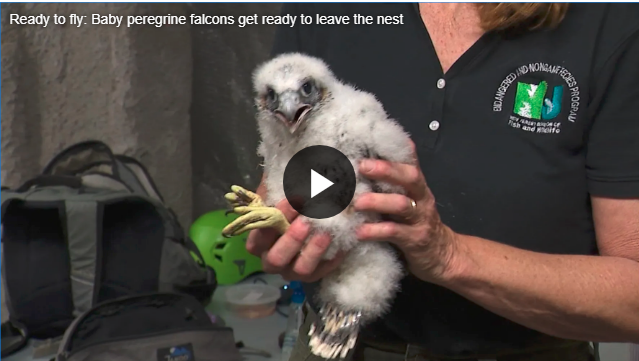Peregrine Falcon Bandings in Jersey City and Union County: The Importance of Banding Chicks
Story by Alison Levine
Two sets of peregrine falcon chicks were recently banded high atop buildings in Elizabeth, Union County, and Jersey City. Biologists from Conserve Wildlife Foundation (CWF) and the New Jersey Department of Environmental Protection’s Endangered and Nongame Species Program (ENSP) checked the health and measurements of the falcons, while also placing both United States Geological Service bird bands and state auxiliary bands so the birds can be identified in the future.
NJTV and TAPintoUnion captured the banding in Union County, while News 12 New Jersey and CBS-2 covered the Jersey City banding.

Just a few decades ago peregrines were completely wiped out east of the Mississippi, in large part because of the pesticide DDT. As DDT moved up the food chain, it became more and more concentrated. By the time the raptors atop that chain ingested their prey, the high concentration of DDT weakened their eggshells so that we lost almost an entire generation of peregrines and other raptors.
Stronger environmental regulations – including the banning of DDT – combined with the stalwart leadership of ENSP and CWF scientists and devoted volunteers to enable peregrines to make an inspiring recovery. And these birds have proved to be highly adaptable to living in urban environments. Last year we documented over 40 pairs in New Jersey alone.
Banding birds is an important part of that recovery.

The data collected from banding is useful in management and conservation projects as well as scientific research. Individual identification of birds lets scientists know about their movement, preferred nesting sites, social structure, life-span, survival rate, reproductive success and population growth. This information allows managers to craft effective plans to ensure that peregrine populations continue to grow and recover.

Both the Elizabeth and Jersey City nests offer the public the chance to get a peek into the lives of these apex predators through webcams.
The Union County Falcon Cam is operated through a partnership between Union County, CWF, and the Department of Environmental Protection. Phillips 66 provides exclusive funding for CWF’s educational programming throughout Union County, utilizing the Falcon Cam to teach STEAM (Science, Technology, Engineering, Art, and Mathematics).
Jersey City’s nest is the site of New Jersey’s longest running Falcon Cam, in operation since 2001. Tens of thousands of viewers tune in to watch these birds raise their young each year. Support from the Zoological Society of New Jersey helps make the Jersey City Falcon Cam possible.
Discover more from Conserve Wildlife Foundation of NJ
Subscribe to get the latest posts sent to your email.